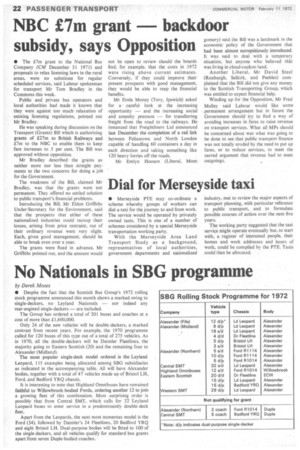lsil3C rim grant backdoor subsidy, says Opposition
Page 24

If you've noticed an error in this article please click here to report it so we can fix it.
• The £7m grant to the National Bus Company (CM December 31 1971) and proposals to relax licensing laws in the rural areas, were no substitute for regular scheduled services, said Labour spokesman for transport Mr Tom Bradley in the Commons this week.
Public and private bus operators and local authorities had made it known that they were against too much relaxation of existing licensing regulations, pointed out Mr Bradley.
He was speaking during discussion on the Transport (Grants) Bill which is authorizing grants of £27m to British Railways and £7m to the NBC to enable them to keep fare increases to 5 per cent. The Bill was approved without opposition.
Mr Bradley described the grants as neither more nor less than straight payments to the two concerns for doing a job for the Government.
The weakness of the Bill, claimed Mr Bradley, was that the grants were not permanent. They offered no settled solution to public transport's financial problems.
Introducing the Bill, Mr Eldon Griffiths Under-Secretary for the Environment, said that the prospects that either of these nationalized industries could recoup their losses, arising from price restraint, out of their ordinary revenue were very slight. Each, given good management, should be able to break even over a year.
The grants were fixed in advance, Mr Griffiths pointed out, and the amount would not be open to review should the boards find, for example, that the costs in 1972 were rising above current estimates. Conversely, if they could improve their present prospects with good management, they would be able to reap the financial benefits.
Mr Ernie Money (Tory, Ipswich) asked for a careful look at the increasing opportunity — and the increasing social and amenity pressure — for transferring freight from the road to the railways. He instanced that Freightliners Ltd announced last December the completion of a rail link between Felixstowe and North London capable of handling 60 containers a day in each direction and taking something like 120 heavy lorries off the roads.
Mr Emlyn boson (Liberal, Mont gomery) said the Bill was a landmark in the economic policy of the Government that had been almost surreptitiously introduced. It was said to deal with a temporary situation, but anyone who believed that was living in cloud-cuckoo land.
Another Liberal, Mr David Steel (Roxburgh, Selkirk. and Peebles) complained that the Bill did not give any money to the Scottish Transporting Group., which was entitled to expect financial help.
Winding up for the Opposition, Mr Fred Mulley said Labour would like some . permanent arrangement but in future the Government should try to find a way of avoiding increases in fares to raise revenue on transport services. What all MPs should be concerned about was what was going to be done to see that public transport finance was not totally eroded by the need to put up fares, or to reduce services, to meet the sacred argument that revenue had to meet outgoings.








































































































